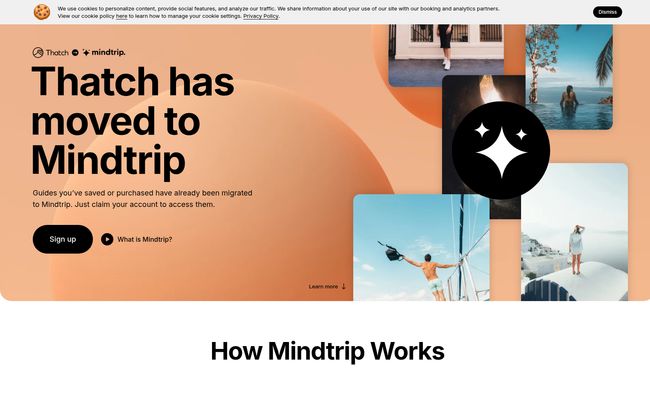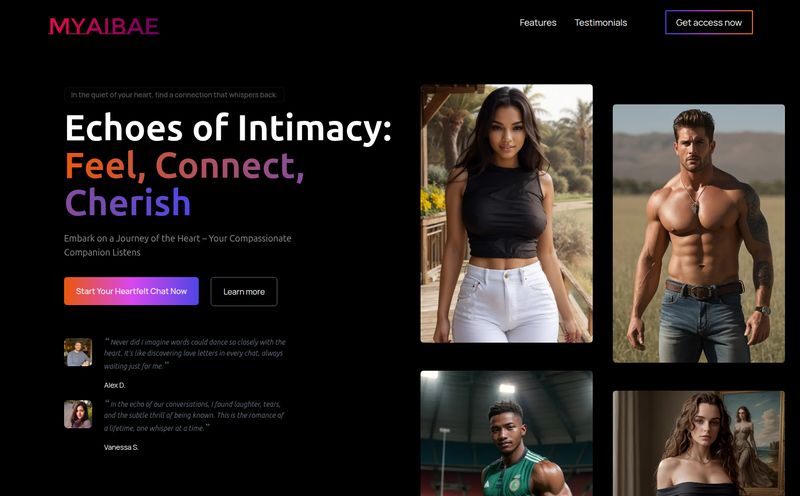Planning a trip is a special kind of beautiful chaos. You start with a spark of an idea—say, “I want to eat my weight in pasta in Italy”—and before you know it, you have 27 tabs open. You're cross-referencing three different blogs, a TikTok video you can’t find anymore, and your cousin’s sister-in-law’s questionable advice from her 2009 backpacking trip. It’s a mess. A glorious, exciting, but ultimately exhausting mess.
For years, I've been on the hunt for a tool that gets it. Something that isn’t just another soulless aggregator or a glorified spreadsheet. So when I heard that Thatch, a platform I’ve kept an eye on for its creator-led travel guides, had evolved into something new called Mindtrip, my curiosity was piqued. They’re making big promises: AI-powered planning, personalized recommendations from local experts, and a way to finally corral all that travel inspo into one sane place. But does it actually work? I had to find out.
So, What's the Big Deal with Mindtrip Anyway?
First off, this isn’t just another ChatGPT-wrapper that spits out the top 10 tourist traps from a Google search. Mindtrip’s approach feels… different. It’s a hybrid model, a digital centaur that combines the speed and brainstorming power of AI with the irreplaceable nuance of real human beings. Remember Thatch? It was built on the idea of connecting travelers with guides made by other travelers and locals. Mindtrip has taken that DNA and plugged it into a smarter, more interactive engine.

Visit Thatch
You can start by chatting with its AI, throwing out vague ideas like “a relaxing week in a coastal town in Portugal that’s not too touristy.” The AI helps you brainstorm and build a basic framework. But here’s the magic: it then connects you with a network of local experts in over 80 countries. These are the people who know which gelateria the locals actually go to, or where to catch the best sunset without a hundred other selfie sticks in your view. It’s this blend of machine efficiency and human soul that makes Mindtrip more than just a search engine.
The Features That Made Me Sit Up and Pay Attention
Okay, so the concept is cool. But what about the actual day-to-day use? I've seen plenty of great ideas fall flat with a clunky interface. Here’s what stood out to me.
The AI + Human Expert Combo is the Secret Sauce
I can’t stress this enough. We’re all playing with AI these days, asking it to write emails or plan our lives. And it’s great for a first draft. But for travel? AI doesn’t know the vibe of a neighborhood. It can’t tell you that a certain cafe has a grumpy-but-lovable barista who makes the best flat white you'll ever taste. That’s where the human experts come in. Mindtrip uses AI for the heavy lifting and data-sifting, and then brings in a real person to add that layer of authenticity and lived experience. It’s like having a super-smart researcher and a cool local friend planning your trip together. Some might argue that you could just find a local on another platform, but Mindtrip brings them into one integrated workflow which is a real step up.
Finally, An End to the Digital Travel Junk Drawer
You know what I’m talking about. The folder on your phone with 84 screenshots of hotel lobbies and restaurant menus. The random notes. The flight confirmation buried in your inbox. Mindtrip acts as a central command center for your entire trip. You can upload all your inspiration—from TikTok, Instagram, wherever—and it helps you organize it. It’s a place for your hotel bookings, flight details, restaurant reservations, and all those little notes-to-self. It turns your chaotic cloud of ideas into an actual, functional itinerary. It's incredibly satisfying, like finally cleaning out that one messy drawer in your kitchen.
Tapping into the Global Grapevine
Beyond the custom planning, there’s a whole ecosystem of pre-made guides and itineraries you can browse. This is a holdover from the Thatch days, and I’m so glad they kept it. These aren't your standard, cookie-cutter guides. They're crafted by food bloggers, photographers, expats, and locals who are passionate about their corner of the world. Want a guide to the best vintage shops in Tokyo? Or a 3-day hiking itinerary in Patagonia? Chances are, someone has built it. You can get a professionally-vetted plan for a fraction of teh cost of a full custom trip, which is a massive win for more budget-conscious travelers.
Who Should Be Using Mindtrip?
Look, if you’re the kind of person who genuinely loves spending 40 hours building a minute-by-minute spreadsheet for your vacation, maybe this isn't for you. And that’s fine! But I think Mindtrip hits a sweet spot for a few types of people:
- The Overwhelmed Planner: You want a fantastic, unique trip, but the sheer volume of information out there gives you anxiety.
- The Authenticity Seeker: You're done with tourist traps. You want to experience a place like a local, find the hidden gems, and have a story to tell.
- The Group Trip Coordinator: Bless your heart, you’ve been tasked with planning a trip for 6 people with 12 different opinions. The collaborative features here could be a lifesaver.
- The Last-Minute Adventurer: You just booked a spontaneous flight and have zero plans. Mindtrip can help you get a solid itinerary together, fast.
Let's Talk Money: The Mindtrip Pricing Puzzle
This is where things get a bit custom. As of my review, there isn't a single, straightforward pricing page with neat little columns. And honestly, that makes sense for this kind of service. Using the platform to browse guides and organize your own stuff seems to be free. The cost comes in when you want to buy a pre-made guide from a creator (which can range from a few dollars to much more) or when you hire a local expert for personalized planning. This fee will obviously vary depending on the complexity and length of your trip. I see it as a flexible, à la carte model. You pay for the value you want, whether it’s a simple PDF guide or a fully-managed, bespoke itinerary.
Answering Your Burning Questions
What happened to Thatch?
Thatch has evolved! It was acquired and has been rebranded and integrated into Mindtrip, combining its creator-led guide marketplace with new AI and collaborative planning tools.
Is Mindtrip free to use?
The basic platform for organizing your travel and brainstorming with the AI appears to be free. You pay for specific products, like buying a pre-made guide from a creator or commissioning a custom-planned trip from a local expert.
Can I make money with Mindtrip?
Yes, that seems to be a core part of the platform. If you have travel expertise, you can create and sell your own travel guides and itineraries, carrying on the creator-focused spirit of Thatch.
How is this different from just using Google Maps?
Google Maps is a tool for navigation and finding locations. Mindtrip is a service for curation and planning. It helps you decide where to go and organizes it all, adding a layer of human expertise that a map can’t provide.
Do I talk to a real person or just an AI?
Both! You can start with the AI for quick ideas and organization, but the platform's big selling point is its network of real human experts you can connect with for personalized, nuanced planning.
Is it good for solo travelers?
Absolutely. For a solo traveler, getting vetted recommendations from a local can be a huge plus for both safety and for finding cool experiences you might not stumble upon alone.
My Final Verdict: Is Mindtrip Your Next Travel Buddy?
After spending some time with it, I’m genuinely optimistic about Mindtrip. In a sea of tech solutions trying to “disrupt” travel, this one feels grounded in what actually makes traveling great: human connection and authentic discovery. It doesn't try to replace the human, it tries to empower it with better tools.
It’s not perfect, and I’m sure it will continue to evolve. But the core idea is incredibly sound. It reduces the friction and stress of planning while increasing the potential for a trip that is truly yours, not one copied from the first page of a search result. For me, that’s a journey worth taking. I think I'll be keeping Mindtrip in my digital toolkit for my next adventure.
Reference and Sources
- Mindtrip Official Website
- TechCrunch: AI-powered trip planner Mindtrip officially launches after acquiring Thatch



